Critical Theory
Critical Theory
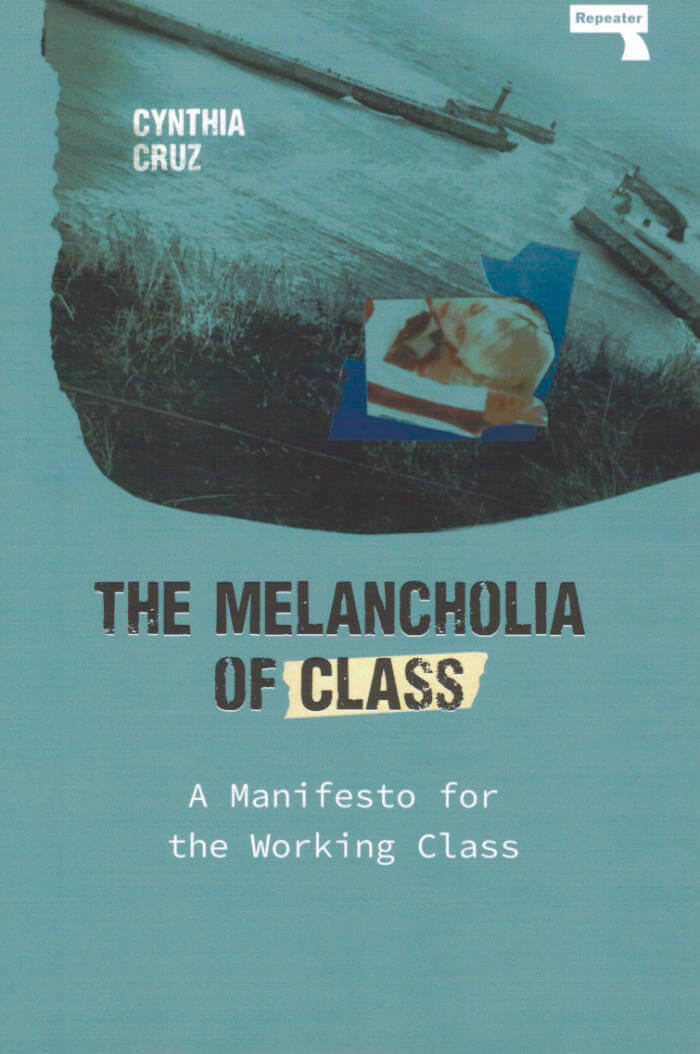
The Melancholia of Class: A Manifesto for the Working Class
In The Melancholia of Class, Cynthia Cruz analyses how this choice between assimilation or annihilation has played out in the lives of working-class musicians, artists, writers, and filmmakers — including Amy Winehouse, Ian Curtis, Jason Molina, Barbara Loden, and many more — and the resultant Freudian melancholia that ensues when the working-class subject leaves their origins to "become someone," only to find that they lose themselves in the process.
Part memoir, part cultural theory, and part polemic, The Melancholia of Class shows us how we can resist assimilation, uplifting and carrying our working-class origins and communities with us, as we break the barriers of the middle-class world. There are so many of us, all of us waiting. If we came together, who knows what we could do.
Cynthia Cruz is the author of six collections of poems: Dregs, How the End Begins, Wunderkammer, The Glimmering Room, Ruin, and Guidebooks for the Dead. Disquieting: Essays on Silence, a collection of critical essays on marginalization and silence, was published by Book*hug in 2019. Her first work of fiction, a novella, Steady Diet of Nothing, is forthcoming. She teaches at the City College of New York and in the MFA Writing Program at Columbia University.
Published 2021

The Telephone Book: Technology, Schizophrenia, Electric Speech
The telephone marks the place of an absence. Affiliated with discontinuity, alarm, and silence, it raises fundamental questions about the constitution of self and other, the stability of location, systems of transfer, and the destination of speech. Profoundly changing our concept of long-distance, it is constantly transmitting effects of real and evocative power. To the extent that it always relates us to the absent other, the telephone, and the massive switchboard attending it, plugs into a hermeneutics of mourning.
The Telephone Book, itself organized by a "telephonic logic," fields calls from philosophy, history, literature, and psychoanalysis. It installs a switchboard that hooks up diverse types of knowledge while rerouting and jamming the codes of the disciplines in daring ways. Avital Ronell has done nothing less than consider the impact of the telephone on modern thought. Her highly original, multifaceted inquiry into the nature of communication in a technological age will excite everyone who listens in. The book begins by calling close attention to the importance of the telephone in Nazi organization and propaganda, with special regard to the philosophy of Martin Heidegger. In the Third Reich the telephone became a weapon, a means of state surveillance, "an open accomplice to lies." Heidegger, in Being and Time and elsewhere, elaborates on the significance of "the call." In a tour de force response, Ronell mobilizes the history and terminology of the telephone to explicate his difficult philosophy.
Ronell also speaks of the appearance of the telephone in the literary works of Duras, Joyce, Kafka, Rilke, and Strindberg. She examines its role in psychoanalysis—Freud said that the unconscious is structured like a telephone, and Jung and R. D. Laing saw it as a powerful new body part. She traces its historical development from Bell's famous first call: "Watson, come here!" Thomas A. Watson, his assistant, who used to communicate with spirits, was eager to get the telephone to talk, and thus to link technology with phantoms and phantasms. In many ways a meditation on the technologically constituted state, The Telephone Book opens a new field, becoming the first political deconstruction of technology, state terrorism, and schizophrenia. And it offers a fresh reading of the American and European addiction to technology in which the telephone emerges as the crucial figure of this age.

Les sous-communs – Planification fugitive et étude noire
A political and aesthetic critique of racial capitalism and modes of social experimentation in the form of resistance to the colonial commons.
Stefano Harney (born 1962) is Honorary Professor at The Institute of Gender, Race, Sexuality and Social Justice at the University of British Columbia and a Visiting Critic at Yale School of Art. He has held teaching positions in New York, Leicester, London, and Singapore. He now teaches at the Dutch Art Institute. An interdisciplinary scholar, his research spans (the intersections of) social sciences, arts and humanities, as well as the fields of business and management.
Preface by Jack Halberstam.
Collective translation (original title: The Undercommons: Fugitive Planning & Black Study, Minor Compositions, 2013).
Graphic design: Sophie Demay & Maël Fournier-Comte (In the Shade of a Tree).
published in February 2022
French edition
12,5 x 19,5 cm (softcover)
208 pages

Beyond the World's End
In Beyond the World's End T. J. Demos explores cultural practices that provide radical propositions for living in a world beset by environmental and political crises.
Rethinking relationships between aesthetics and an expanded political ecology that foregrounds just futurity, Demos examines how contemporary artists are diversely addressing urgent themes, including John Akomfrah's cinematic entanglements of racial capitalism with current environmental threats, the visual politics of climate refugees in work by Forensic Architecture and Teddy Cruz and Fonna Forman, and moving images of Afrofuturist climate justice in projects by Arthur Jafa and Martine Syms.
Demos considers video and mixed-media art that responds to resource extraction in works by Angela Melitopoulos, Allora & Calzadilla, and Ursula Biemann, as well as the multispecies ecologies of Terike Haapoja and Public Studio. Throughout Demos contends that contemporary intersections of aesthetics and politics, as exemplified in the Standing Rock #NoDAPL campaign and the Zad's autonomous zone in France, are creating the imaginaries that will be crucial to building a socially just and flourishing future.

Complaint!
In Complaint! Sara Ahmed examines what we can learn about power from those who complain about abuses of power.
Drawing on oral and written testimonies from academics and students who have made complaints about harassment, bullying, and unequal working conditions at universities, Ahmed explores the gap between what is supposed to happen when complaints are made and what actually happens. To make complaints within institutions is to learn how they work and for whom they work: complaint as feminist pedagogy. Ahmed explores how complaints are made behind closed doors and how doors are often closed on those who complain. To open these doors—to get complaints through, keep them going, or keep them alive—Ahmed emphasizes, requires forming new kinds of collectives.
This book offers a systematic analysis of the methods used to stop complaints and a powerful and poetic meditation on what complaints can be used to do. Following a long lineage of Black feminist and feminist of color critiques of the university, Ahmed delivers a timely consideration of how institutional change becomes possible and why it is necessary.

Between Gaia and Ground
In Between Gaia and Ground Elizabeth A. Povinelli theorizes the climatic, environmental, viral, and social catastrophe present as an ancestral catastrophe through which that Indigenous and colonized peoples have been suffering for centuries. In this way, the violence and philosophies the West relies on now threaten the West itself.
Engaging with the work of Glissant, Deleuze and Guattari, Césaire, and Arendt, Povinelli highlights four axioms of existence—the entanglement of existence, the unequal distribution of power, the collapse of the event as essential to political thought, and the legacies of racial and colonial histories. She traces these axioms' inspiration in anticolonial struggles against the dispossession and extraction that have ruined the lived conditions for many on the planet. By examining the dynamic and unfolding forms of late liberal violence, Povinelli attends to a vital set of questions about changing environmental conditions, the legacies of violence, and the limits of inherited Western social theory.
Between Gaia and Ground also includes a glossary of the keywords and concepts that Povinelli has developed throughout her work.

Dear Science and Other Stories
In Dear Science and Other Stories Katherine McKittrick presents a creative and rigorous study of black and anticolonial methodologies. Drawing on black studies, studies of race, cultural geography, and black feminism as well as a mix of methods, citational practices, and theoretical frameworks, she positions black storytelling and stories as strategies of invention and collaboration.
She analyzes a number of texts from intellectuals and artists ranging from Sylvia Wynter to the electronica band Drexciya to explore how narratives of imprecision and relationality interrupt knowledge systems that seek to observe, index, know, and discipline blackness. Throughout, McKittrick offers curiosity, wonder, citations, numbers, playlists, friendship, poetry, inquiry, song, grooves, and anticolonial chronologies as interdisciplinary codes that entwine with the academic form.
Suggesting that black life and black livingness are, in themselves, rebellious methodologies, McKittrick imagines without totally disclosing the ways in which black intellectuals invent ways of living outside prevailing knowledge systems.

Cruel Optimism
A relation of cruel optimism exists when something you desire is actually an obstacle to your flourishing. Offering bold new ways of conceiving the present, Lauren Berlant describes the cruel optimism that has prevailed since the 1980s, as the social-democratic promise of the postwar period in the United States and Europe has retracted. People have remained attached to unachievable fantasies of the good life—with its promises of upward mobility, job security, political and social equality, and durable intimacy—despite evidence that liberal-capitalist societies can no longer be counted on to provide opportunities for individuals to make their lives “add up to something.”
Arguing that the historical present is perceived affectively before it is understood in any other way, Berlant traces affective and aesthetic responses to the dramas of adjustment that unfold amid talk of precarity, contingency, and crisis. She suggests that our stretched-out present is characterized by new modes of temporality, and she explains why trauma theory—with its focus on reactions to the exceptional event that shatters the ordinary—is not useful for understanding the ways that people adjust over time, once crisis itself has become ordinary. Cruel Optimism is a remarkable affective history of the present.

The Queer Art of Failure
The Queer Art of Failure is about finding alternatives—to conventional understandings of success in a heteronormative, capitalist society; to academic disciplines that confirm what is already known according to approved methods of knowing; and to cultural criticism that claims to break new ground but cleaves to conventional archives.
Jack Halberstam proposes “low theory” as a mode of thinking and writing that operates at many different levels at once. Low theory is derived from eccentric archives. It runs the risk of not being taken seriously. It entails a willingness to fail and to lose one’s way, to pursue difficult questions about complicity, and to find counterintuitive forms of resistance.
Tacking back and forth between high theory and low theory, high culture and low culture, Halberstam looks for the unexpected and subversive in popular culture, avant-garde performance, and queer art. Halberstam pays particular attention to animated children’s films, revealing narratives filled with unexpected encounters between the childish, the transformative, and the queer. Failure sometimes offers more creative, cooperative, and surprising ways of being in the world, even as it forces us to face the dark side of life, love, and libido.

Pornotopia
Published for the first time in 1953, Playboy was not only the first pornographic popular magazine in America; it also came to embody an entirely new lifestyle through the construction of a series of utopian multimedia spaces — from the Playboy Mansion and fictional Playboy's Penthouse of 1959 to the Playboy Clubs and hotels appearing around the world in the 1960s. Simultaneously, the invention of the contraceptive pill provided access to a biochemical technique that separated (hetero) sexuality and reproduction.
Addressing these concurrent cultural shifts, Paul Preciado investigates the strategic relationships between space, gender, and sexuality in popular sites related to the production and consumption of pornography that have tended to reside at the margins of traditional histories of architecture: bachelor pads, multimedia rotating beds, and design objects, among others.
Combining historical perspectives with contemporary critical theory, gender and queer theory, porn studies, the history of technology, and a range of primary transdisciplinary sources — treatises on sexuality, medical and pharmaceutical handbooks, architecture journals, erotic magazines, building manuals, and novels — Pornotopia explores the use of architecture as a biopolitical technique for governing sexual relations and the production of gender in the postwar United States.
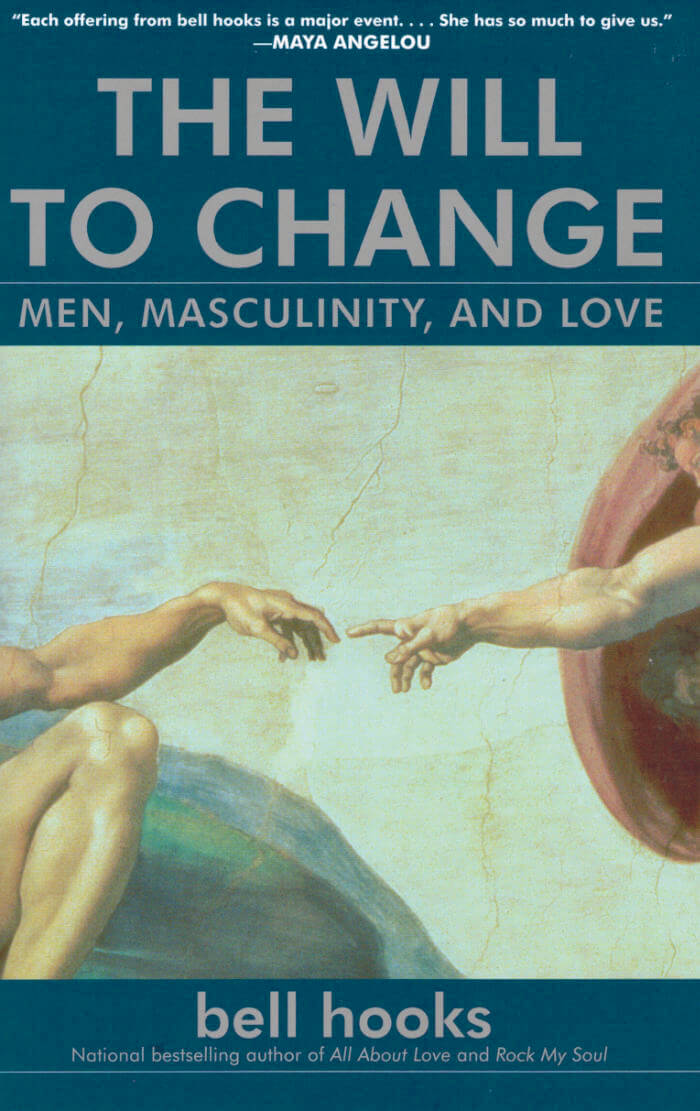
The Will to Change
Everyone needs to love and be loved — even men. But to know love, men must be able to look at the ways that patriarchal culture keeps them from knowing themselves, from being in touch with their feelings, from loving. In The Will to Change, bell hooks gets to the heart of the matter and shows men how to express the emotions that are a fundamental part of who they are — whatever their age, marital status, ethnicity, or sexual orientation. With trademark candor and fierce intelligence, hooks addresses the most common concerns of men, such as fear of intimacy and loss of their patriarchal place in society, in new and challenging ways. She believes men can find the way to spiritual unity by getting back in touch with the emotionally open part of themselves — and lay claim to the rich and rewarding inner lives that have historically been the exclusive province of women. A brave and astonishing work, The Will to Change is designed to help men reclaim the best part of themselves.
bell hooks was a cultural critic, a feminist theorist, and the renowned author of more than twenty books, including Rock My Soul, The Will to Change, Sisters of the Yam, and When Angels Speak of Love. A charismatic speaker, she divided her time between teaching, writing, and lecturing around the world. A resident of Kentucky and New York City, she passed away in 2021.
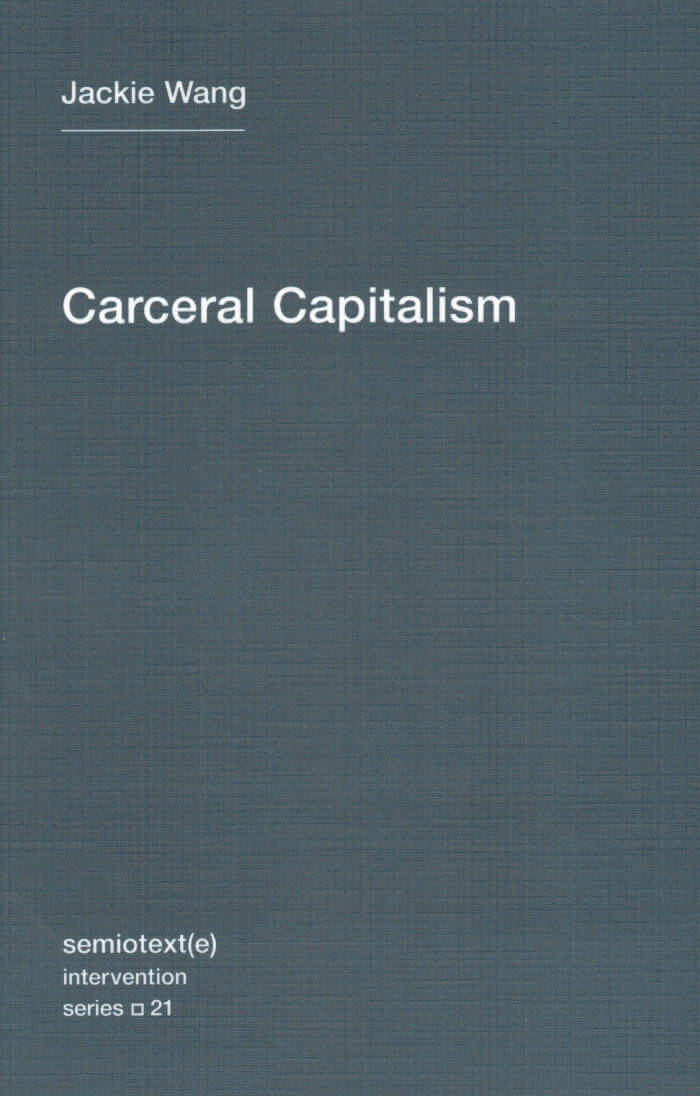
Carceral Capitalism
Essays on the contemporary continuum of incarceration: the biopolitics of juvenile delinquency, predatory policing, the political economy of fees and fines, and algorithmic policing.
What we see happening in Ferguson and other cities around the country is not the creation of livable spaces, but the creation of living hells. When people are trapped in a cycle of debt it also can affect their subjectivity and how they temporally inhabit the world by making it difficult for them to imagine and plan for the future. What psychic toll does this have on residents? How does it feel to be routinely dehumanized and exploited by the police?
In this collection of essays in Semiotext(e)'s Intervention series, Jackie Wang examines the contemporary incarceration techniques that have emerged since the 1990s. The essays illustrate various aspects of the carceral continuum, including the biopolitics of juvenile delinquency, predatory policing, the political economy of fees and fines, cybernetic governance, and algorithmic policing. Included in this volume is Wang's influential critique of liberal anti-racist politics, "Against Innocence," as well as essays on RoboCop, techno-policing, and the aesthetic problem of making invisible forms of power legible.
Wang shows that the new racial capitalism begins with parasitic governance and predatory lending that extends credit only to dispossess later. Predatory lending has a decidedly spatial character and exists in many forms, including subprime mortgage loans, student loans for sham for-profit colleges, car loans, rent-to-own scams, payday loans, and bail bond loans. Parasitic governance, Wang argues, operates through five primary techniques: financial states of exception, automation, extraction and looting, confinement, and gratuitous violence. While these techniques of governance often involve physical confinement and the state-sanctioned execution of black Americans, new carceral modes have blurred the distinction between the inside and outside of prison. As technologies of control are perfected, carcerality tends to bleed into society.

The Undercommons: Fugitive Planning and Black Study
In this series of essays Fred Moten and Stefano Harney draw on the theory and practice of the black radical tradition as it supports, inspires, and extends contemporary social and political thought and aesthetic critique. Today the general wealth of social life finds itself confronted by mutations in the mechanisms of control, from the proliferation of capitalist logistics through governance by credit and management of pedagogy.
Working from and within the social poesis of life in the undercommons Moten and Harney develop and expand an array of concepts: study, debt, surround, planning, and the shipped. On the fugitive path of an historical and global blackness, the essays in this volume unsettle and invite the reader to the self-organised ensembles of social life that are launched every day and every night amid the general antagonism of the undercommons.
Published 2013.
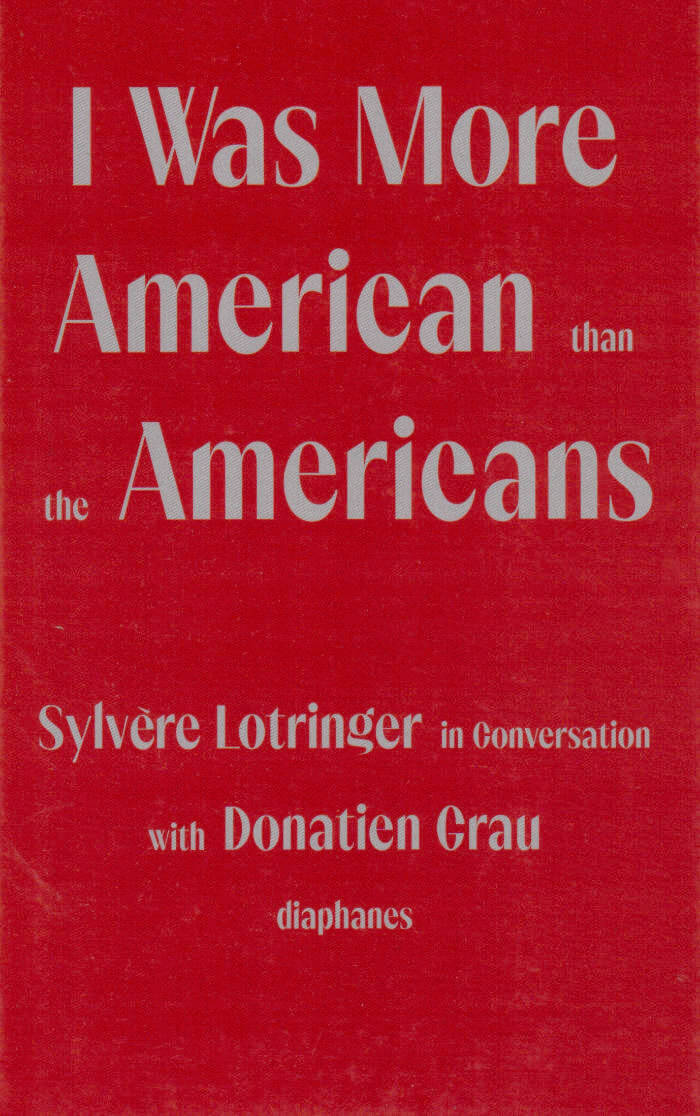
I Was More American than the Americans
Sylvère Lotringer, Donatien Grau
A personal take on French Theory by one of the people who invented it.
In the mid-1970s, Sylvère Lotringer created Semiotext(e), a philosophical group that became a magazine and then a publishing house. Since its creation, Semio-text(e) has been a place of stimulating dialogue between artists and philosophers, and for the past fifty years, much of American artistic and intellectual life has depended on it. The model of the journal and the publishing house revolves around the notion of the collective, and Lotringer has rarely shared his personal journey: his existence as a hidden child during World War II; the liberating and then traumatic experience of the collective in the kibbutz; his Parisian activism in the 1960s; his time of wandering, that took him, by way of Istanbul, to the United States; and then, of course, his American years, the way he mingled his nightlife with the formal experimentation he invented with Semiotext(e) and with his classes. Since the early 2010s, Donatien Grau has developed the habit of visiting Lotringer during his trips to Los Angeles; some of their dialogs were published or held in public. This book is an entry into Lotringer's life, his friendships, his choices, and his admiration for some of the leading thinkers of our times. The conversations between Lotringer and Grau show bursts of life, traces of a journey, through texts and existence itself, with an unusual intensity.

Anarchy – In a Manner of Speaking
David Graeber's interviews (with Mehdi Belhaj Kacem, Nika Dubrovsky, and Assia Turquier-Zauberman) redefine the contours of what an anarchist morality could be today.
David Graeber's influential thinking was always at odds with the liberal and left-wing mainstream. Drawing on his huge theoretical and practical experience as an ethnologist and anthropologist, activist and anarchist, Graeber and his interlocutors develop a ramified genealogy of anarchist thought and possible perspectives for 21st-century politics.
Diverging from the familiar lines of historical anarchism, and against the background of movements such as Occupy Wall Street and the Gilets Jaunes, the aim is to provide new political impulses that go beyond the usual schemata of unavoidableness. The spontaneous and swift-moving polylogue shows Graeber as a spirited, unorthodox thinker and radical activist for whom the group can always achieve more than the individual.
David Graeber (1961-2020) was an American anthropologist, anarchist, political activist, the author of several books, and a leading figure in the Occupy Wall Street movement. Until 2007 he was assistant and associate professor of anthropology at Yale University, until 2013 a reader for Social Anthropology at Goldsmiths, University of London, and until last a professor of anthropology at the London School of Economics.

L'anarchie – pour ainsi dire
David Graeber's interviews (with Mehdi Belhaj Kacem, Nika Dubrovsky, and Assia Turquier-Zauberman) redefine the contours of what an anarchist morality could be today.
Also available in English edition.
David Graeber (1961-2020) was an American anthropologist, anarchist, political activist, the author of several books, and a leading figure in the Occupy Wall Street movement. Until 2007 he was assistant and associate professor of anthropology at Yale University, until 2013 a reader for Social Anthropology at Goldsmiths, University of London, and until last a professor of anthropology at the London School of Economics.

Cruising Utopia: the Then and There of Queer Futurity
A 10th anniversary edition of this field defining work—an intellectual inspiration for a generation of LGBTQ scholars
Cruising Utopia arrived in 2009 to insist that queerness must be reimagined as a futurity-bound phenomenon, an insistence on the potentiality of another world that would crack open the pragmatic present. Part manifesto, part love-letter to the past and the future, José Esteban Muñoz argued that the here and now were not enough and issued an urgent call for the revivification of the queer political imagination.
On the anniversary of its original publication, this edition includes two essays that extend and expand the project of Cruising Utopia, as well as a new foreword by the current editors of Sexual Cultures, the book series he co-founded with Ann Pellegrini 20 years ago. This 10th anniversary edition celebrates the lasting impact that Cruising Utopia has had on the decade of queer of color critique that followed and introduces a new generation of readers to a future not yet here.

Margaret Mead Made Me Gay: Personal Essays, Public Ideas
Margaret Mead Made Me Gay is the intellectual autobiography of cultural anthropologist Esther Newton, a pioneer in gay and lesbian studies. Chronicling the development of her ideas from the excitement of early feminism in the 1960s to friendly critiques of queer theory in the 1990s, this collection covers a range of topics such as why we need more precise sexual vocabularies, why there have been fewer women doing drag than men, and how academia can make itself more hospitable to queers. It brings together such classics as “The Mythic Mannish Lesbian” and “Dick(less) Tracy and the Homecoming Queen” with entirely new work such as “Theater: Gay Anti-Church.”
Newton’s provocative essays detail a queer academic career while offering a behind-the-scenes view of academic homophobia. In four sections that correspond to major periods and interests in her life—”Drag and Camp,” “Lesbian-Feminism,” “Butch,” and “Queer Anthropology”—the volume reflects her successful struggle to create a body of work that uses cultural anthropology to better understand gender oppression, early feminism, theatricality and performance, and the sexual and erotic dimensions of fieldwork. Combining personal, theoretical, and ethnographic perspectives, Margaret Mead Made Me Gay also includes photographs from Newton’s personal and professional life.
With wise and revealing discussions of the complex relations between experience and philosophy, the personal and the political, and identities and practices, Margaret Mead Made Me Gay is important for anyone interested in the birth and growth of gay and lesbian studies.

Social Choreography
Through the concept of “social choreography” Andrew Hewitt demonstrates how choreography has served not only as metaphor for modernity but also as a structuring blueprint for thinking about and shaping modern social organization. Bringing dance history and critical theory together, he shows that ideology needs to be understood as something embodied and practiced, not just as an abstract form of consciousness. Linking dance and the aesthetics of everyday movement—such as walking, stumbling, and laughter—to historical ideals of social order, he provides a powerful exposition of Marxist debates about the relation of ideology and aesthetics.
Hewitt focuses on the period between the mid-nineteenth century and the early twentieth and considers dancers and social theorists in Germany, Britain, France, and the United States. Analyzing the arguments of writers including Friedrich Schiller, Theodor Adorno, Hans Brandenburg, Ernst Bloch, and Siegfried Kracauer, he reveals in their thinking about the movement of bodies a shift from an understanding of play as the condition of human freedom to one prioritizing labor as either the realization or alienation of embodied human potential. Whether considering understandings of the Charleston, Isadora Duncan, Nijinsky, or the famous British chorus line the Tiller Girls, Hewitt foregrounds gender as he uses dance and everyday movement to rethink the relationship of aesthetics and social order.

Testo Junkie
What constitutes a real man or woman in the twenty-first century? Since birth control pills, erectile dysfunction remedies, and factory-made testosterone and estrogen were developed, biology is definitely no longer destiny.
In this penetrating analysis of gender, Paul B. Preciado shows the ways in which the synthesis of hormones since the 1950s has fundamentally changed how gender and sexual identity are formulated, and how the pharmaceutical and pornography industries are in the business of creating desire. This riveting continuation of Michel Foucault's The History of Sexuality also includes Preciado's diaristic account of his own use of testosterone every day for one year, and its mesmerizing impact on his body as well as his imagination.

The Dawn of Everything: A New History of Humanity
A dramatically new understanding of human history, challenging our most fundamental assumptions about social evolution — from the development of agriculture and cities to the origins of the state, democracy, and inequality — and revealing new possibilities for human emancipation.
For generations, our remote ancestors have been cast as primitive and childlike — either free and equal innocents, or thuggish and warlike. Civilization, we are told, could be achieved only by sacrificing those original freedoms or, alternatively, by taming our baser instincts. David Graeber and David Wengrow show how such theories first emerged in the eighteenth century as a conservative reaction to powerful critiques of European society posed by Indigenous observers and intellectuals. Revisiting this encounter has startling implications for how we make sense of human history today, including the origins of farming, property, cities, democracy, slavery, and civilization itself.
Drawing on pathbreaking research in archaeology and anthropology, the authors show how history becomes a far more interesting place once we learn to throw off our conceptual shackles and perceive what's really there. If humans did not spend 95 percent of their evolutionary past in tiny bands of hunter-gatherers, what were they doing all that time? If agriculture, and cities, did not mean a plunge into hierarchy and domination, then what kinds of social and economic organization did they lead to? The answers are often unexpected, and suggest that the course of human history may be less set in stone, and more full of playful, hopeful possibilities, than we tend to assume.
"Graeber and Wengrow have effectively overturned everything I ever thought about the history of the world. A thorough and elegant refutation of evolutionary theories of history, The Dawn of Everything introduces us to a world populated by smart, creative, complicated people who, for thousands of years, invented virtually every form of social organization imaginable and pursued freedom, knowledge, experimentation, and happiness way before the "Enlightenment." The authors don't just debunk the myths, they give a thrilling intellectual history of how they came about, why they persist, and what it all means for the just future we hope to create. The most profound and exciting book I've read in thirty years." — Robin D.G. Kelley, Gary B. Nash Endowed Chair in U.S. History, UCLA, author of Freedom Dreams: The Black Radical Imagination

Some Styles of Masculinity
An intimate, urgent and riotous account of masculinity, whiteness, queerness and belief in America.
In winter 2018, Gregg Bordowitz performed a three-part lecture series at the New Museum as part of Trigger: Gender as a Tool and a Weapon. Each evening, he explored an avatar of masculinity that was formative to him as he came of age as an outer-borough child of Jewish immigrants, then as an artist-activist in Manhattan at the dawn of the AIDS crisis: the rock star, the rabbi and the comedian. He merged personal and political history, ribald humor and social criticism, performer and persona.
Some Styles of Masculinity is a self-portrait and an essay on upheaval and plague, based on transcripts of the eponymous series, which Bordowitz has reimagined for the page. He asserts that gender can't be separated from ethnicity, sexuality, class or nationality, and he connects these aspects of himself through personal anecdotes as well as reflections on whiteness, diaspora, comedy and Jewish mysticism. Some Styles of Masculinity evokes David Antin's "talk poems," Maggie Nelson's "autotheory," David France's How to Survive a Plague and Wayne Koestenbaum's casually erudite criticism. This book is a winding, intimate, urgent, freewheeling account of thinking and enduring in difficult times.
Gregg Bordowitz (born 1964) is the author of Glenn Ligon: Untitled (I Am a Man) (2018), General Idea: Imagevirus (Afterall Books, 2010) and The AIDS Crisis Is Ridiculous and Other Writings, 1986-2003 (2004). He was an early participant in ACT UP (AIDS Coalition to Unleash Power), where he cofounded several video collectives.

Beasts of Burden: Animal and Disability Liberation
A beautifully written, deeply provocative inquiry into the intersection of animal and disability liberation, and the debut of an important new social critic.
How much of what we understand of ourselves as "human" depends on our physical and mental abilities, how we move (or cannot move) in and interact with the world? And how much of our definition of "human" depends on its difference from "animal"?
Drawing on her own experiences as a disabled person, a disability activist, and an animal advocate, author Sunaura Taylor persuades us to think deeply, and sometimes uncomfortably, about what divides the human from the animal, the disabled from the nondisabled, and what it might mean to break down those divisions, to claim the animal and the vulnerable in ourselves, in a process she calls "cripping animal ethics."
Beasts of Burden suggests that issues of disability and animal justice—which have heretofore primarily been presented in opposition—are in fact deeply entangled. Fusing philosophy, memoir, science, and the radical truths these disciplines can bring, whether about factory farming, disability oppression, or our assumptions of human superiority over animals, Taylor draws attention to new worlds of experience and empathy that can open up important avenues of solidarity across species and ability. Beasts of Burden is a wonderfully engaging and elegantly written work, both philosophical and personal, by a brilliant new voice.
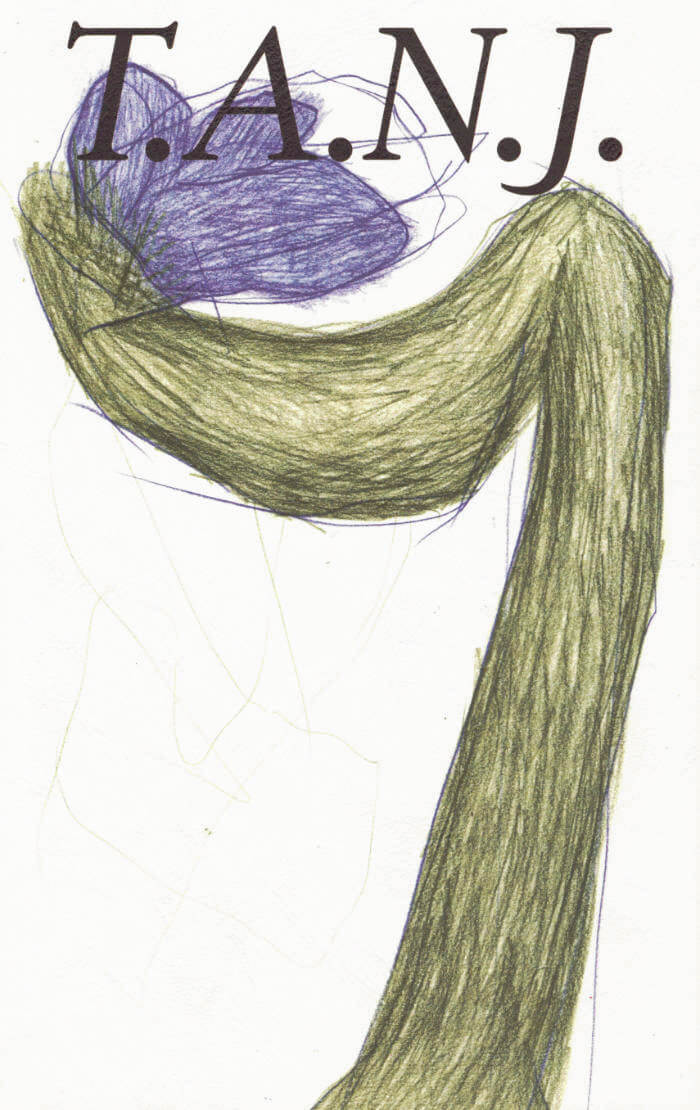
The Against Nature Journal #3
Aimar Arriola, Grégory Castéra
This third issue reviews the many ways in which medicine has pathologized non-procreative sexual desire— those bodies that challenge gender binaries or expose different abilities—while imagining other ways of collectively well-being.
"The issue opens with a commissioned work by visual artists CANDICE LIN and P. STAFF that evokes the central concerns of the journal in subtle and unexpected ways. Lambda Literary Award–winner INDRAPRAMIT DAS speculates on other forms of kinship in a new science-fiction story, while a transnational questionnaire offers insights into the continuous fight for reproductive justice.
We republish a chapter from the autobiography of the late South African, trans, traditional healer NKUNZI ZANDILE NKABINDE, which is introduced by RUTH MORGAN.
We continue to honor the power of poetry with works by ROSA CHÁVEZ and STELLA NYANZI, while celebrating the energy of collective action with a piece by WHAT WOULD AN HIV DOULA DO? In anticipation to his new book on queer desire in the Caribbean, scholar ANDIL GOSINE shares a previous article addressing the notion of “against nature,” while our Columns section brings news from Brazil, India, Kenya, Lebanon, Malaysia, Morocco, and the UK during a season of pandemic fatigue, but also care work, organization, and hope." — the editors